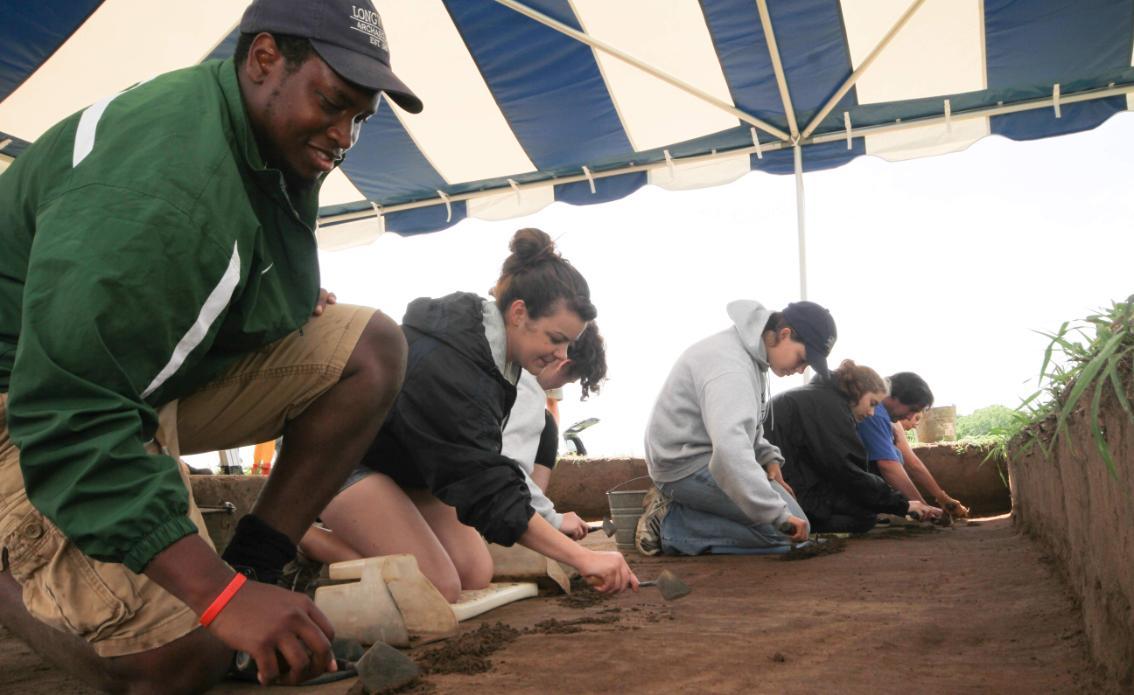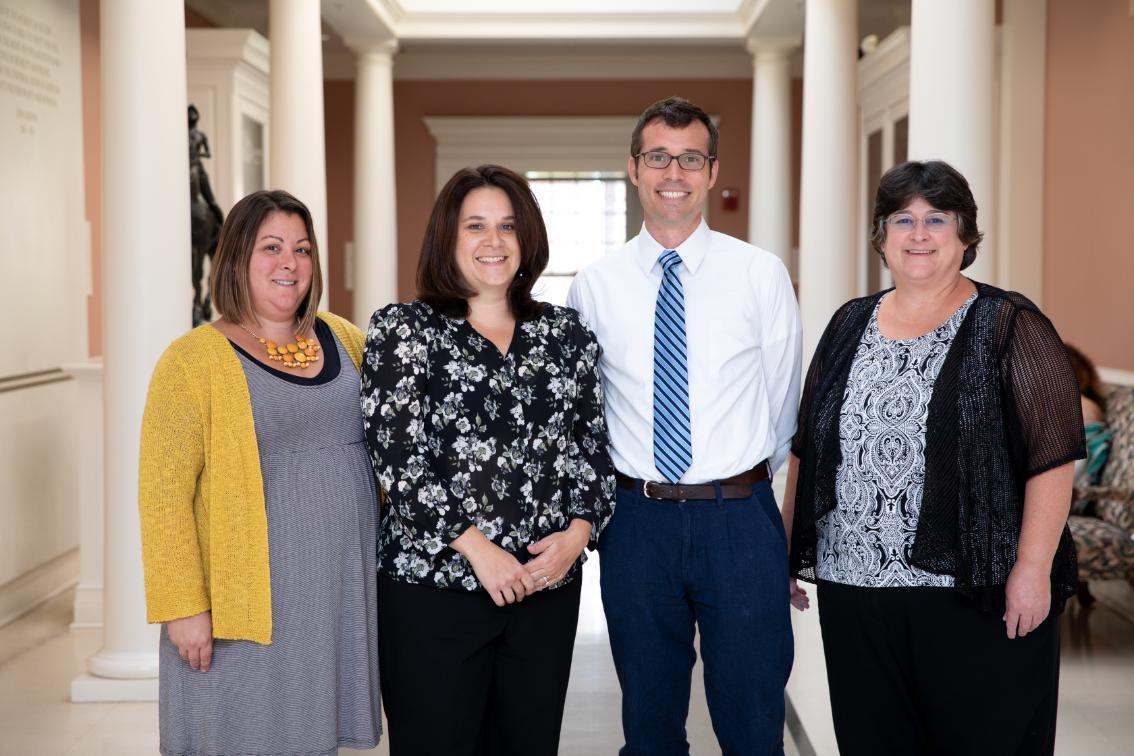

Longwood University faculty members were recently awarded two grants from the National Science Foundation—totaling more than $1.2 million—to fund innovative programs that will help area fourth-grade teachers incorporate science, technology, engineering and math (STEM) learning into their lesson plans and encourage college students to gain STEM competencies through archaeology field research.
One NSF grant of almost $600,000 will fund a three-year project that aims to improve STEM competency through archaeology field research. The grant was awarded to Dr. Brian Bates ’92, professor of anthropology and executive director of the Institute of Archaeology.
Whether it is getting our students out into the field to learn STEM concepts through hands-on experiences or preparing teachers to teach STEM through integrative learning, these programs are at the very heart of our mission to prepare well-rounded citizen leaders.
Dr. Larissa Smith, provost and vice president for academic affairs Tweet This
A second NSF grant of more than $647,000 is funding an interdisciplinary project that will develop and test a professional-development program for fourth-grade teachers in rural elementary schools. The project is a collaboration between Longwood’s Institute for Teaching through Technology and Innovative Practices (ITTIP), the mathematics and computer science department, the biological and environmental sciences department and rural schools in central and southside Virginia. The grant was awarded to Dr. Paula Leach, director of ITTIP, which is located in South Boston; Dr. Ben Campbell, assistant professor of science education, and Dr. Virginia Lewis ’92, associate professor of mathematics education, both on the main Longwood campus; and Stephanie Playton, STEM learning specialist at ITTIP.
“Through these grants, Longwood faculty and staff have been truly innovative, while also building on our historic strengths in archaeology and in teacher education,” said Dr. Larissa Smith, provost and vice president for academic affairs. “Individuals with STEM skills continue to be in high demand both in Virginia and across the country. Whether it is getting our students out into the field to learn STEM concepts through hands-on experiences or preparing teachers to teach STEM through integrative learning, these programs are at the very heart of our mission to prepare well-rounded citizen leaders.”
We are hoping we can impact STEM learning for low-income, first-generation students who may come from educationally disadvantaged school divisions
Dr. Brian Bates ’92, professor of anthropology and executive director of the Institute of Archaeology Tweet This
Bates’ project that is supported by the NSF grant (#1914456) is getting underway this fall with initial field data collection. The NSF has long recognized archaeology as a STEM discipline, although many students do not think about the subject that way. Bates’ hypothesis is that students who participate in archaeology field research projects will achieve mastery of STEM competencies at a better rate than students who don’t do that kind of research.
“This project is innovative in that it will engage students through field research in a subject they don’t traditionally perceive as STEM—archaeology.” Bates said. He said the NSF grant will profoundly impact Longwood students in a number of ways, including making STEM more accessible to a broader range of students.
“We are hoping we can impact STEM learning for low-income, first-generation students who may come from educationally disadvantaged school divisions,” Bates said. “If field research does in fact help people learn STEM skills, then we need to make those opportunities more accessible to students.”
Bates’ NSF grant includes $40,500 to cover scholarships for students to participate in the Summer Archaeology Field School, where students learn the basics of archaeological fieldwork. The grant provides an additional $119,000 in stipends directly to undergraduate students to facilitate their participation in extended field research.
“By pairing the scholarship money with the stipend money, we are making these research opportunities accessible to students,” he said. “Plus we have funding for two students to do an in-depth research project for a semester. There’s real money on the table.”
The NSF is an independent federal agency that promotes the progress of science by supporting basic research and the goals of discovery, learning, research infrastructure and stewardship. The NSF also works to expand the scientific literacy of all citizens, and one of its missions is to support science and engineering education from pre-K through graduate school and beyond.

The NSF grant (#1933717) awarded to the partnership of Longwood math and science professors and ITTIP faculty goes directly to the heart of the NSF mission to ensure there are plenty of capable teachers to educate the next generation in STEM and emerging STEM fields. Their $647,000 project, funded through the NSF’s STEM +Computing program, aims to help fourth-grade teachers gain experience designing lessons that integrate computational thinking into science and mathematics.
Campbell, the professor who is involved with preparing future science teachers at Longwood, said that, in general, STEM isn’t given as much attention at the elementary school level and that computational thinking is a newer field and hasn’t yet been translated into the traditional school curriculum.
“This is a good way to incorporate that discipline into elementary education and start to prepare students for what they will learn in middle and high school and eventually for the real world,” Campbell said. “Today’s jobs are more and more heavily reliant on computing.”
The overarching goals of the project are to increase rural elementary teachers’ content and pedagogical knowledge of computational-thinking skills and to make them more confident in integrating those concepts into their lessons. The project also aims to improve student awareness of and skill with computational thinking.
The four Longwood faculty members working in partnership are still finalizing the details of the project, which will get underway next spring. Their plan is to work with 24 teachers over the course of two academic years. Their initial idea is to focus the lesson plans on water and watersheds, and they plan to utilize Hull Springs Farm by taking teachers in the program there for a summer session.
“In addition to the summer professional development, we are excited this research project will provide the opportunity to support teachers in their classrooms during the school year as they integrate curriculum,” said Leach, the principal investigator on the project.
In fiscal year 2018, the NSF made more than $156 million in awards to Virginia in support of fundamental research, advanced technical education, STEM teacher training, small business development and more. The NSF invested $33.47 million in STEM education in Virginia in the last fiscal year.
